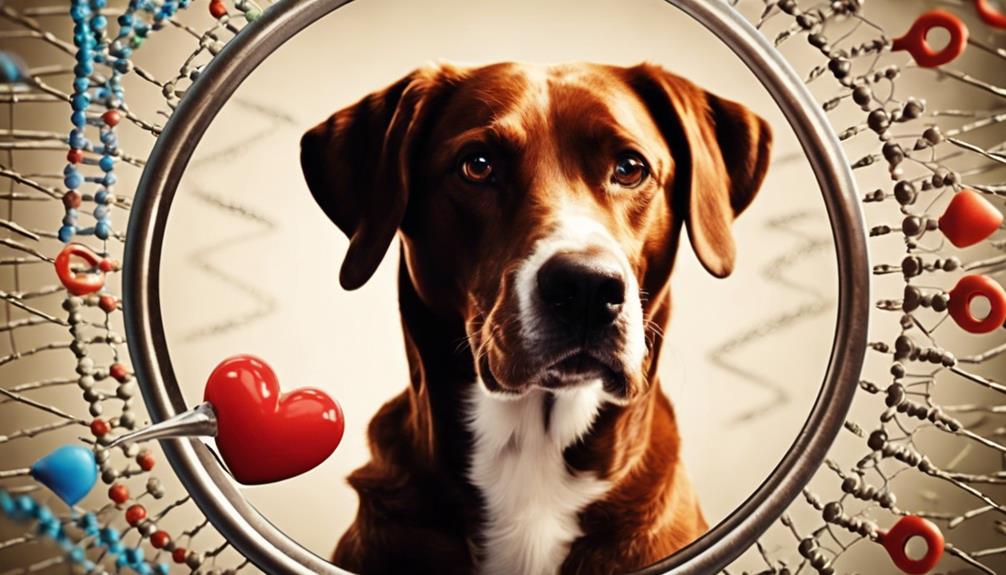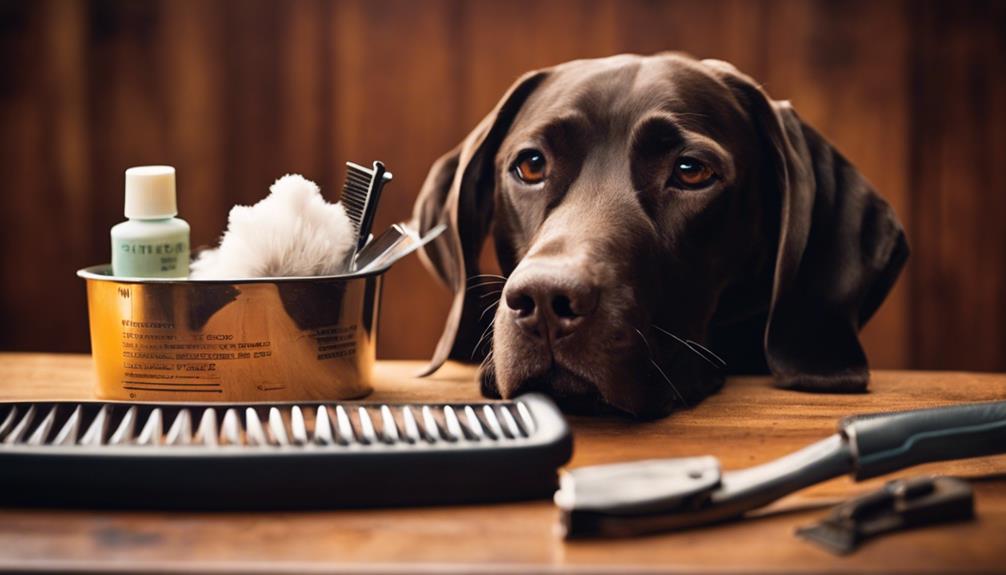Lab Pointer: Dog Breed Overview
The Lab Pointer is a dynamic mix between the Labrador Retriever and Pointer, first seen in the 1980s. This breed is on the larger side and stands out for its smart, loyal nature alongside an energetic spirit. Lab Pointers have a strong build and are quite easy to groom, but they love to stay active. They fit well into family settings, including those with kids and other pets, thanks to their adaptable and friendly nature. Regular exercise and mental challenges are key to keeping them happy.
Lab Pointers are known for their pleasant temperament, ability to adapt, and natural hunting abilities. To ensure a Lab Pointer grows into a well-balanced pet, owners should focus on their care, training, and health needs. This approach leads to a fulfilling partnership with these remarkable dogs.
Key Takeaways
- Lab Pointers, a Labrador and Pointer mix, are smart and loyal.
- They thrive on daily activity to prevent boredom.
- Family-friendly and low maintenance in grooming.
Quick Facts
The Lab Pointer, a blend of the Labrador Retriever and Pointer, came into the scene during the 1980s. This hybrid is known for its high intelligence, boundless energy, and friendly nature. Combining qualities from its Labrador and Pointer parents, the Lab Pointer is a great all-around companion. They typically stand 22 to 25 inches tall and weigh between 35 to 50 pounds, showcasing a well-proportioned body that’s ready for action.
Thanks to their smarts, Lab Pointers are a breeze to train and eager to make their owners happy. However, their sharp minds and vitality mean they need plenty of exercise and activities to stay satisfied and well-behaved. Regular walks, runs, and playtime are key for their physical and mental health. Starting training and socialization early helps them grow into sociable and well-rounded dogs.
Feeding them the right amount of quality dry food, around 2-2.5 cups daily, supports their active lifestyle. It’s crucial to watch their diet closely to avoid weight gain, which is a common issue for this breed.
Overview

Born in the early 2000s, the Lab Pointer is a perfect mix of the Labrador Retriever and the Pointer. This blend creates a dog that’s great for people who love to be outdoors. The Lab Pointer has the speed and skill for tracking from the Pointer side, and the love for swimming and fetching from the Labrador side. This mix has produced a dog that is medium to large in size, with a muscular body that shows it’s ready for any kind of physical activity.
Caring for a Lab Pointer is pretty easy when it comes to grooming. They just need a quick brush now and then and the occasional bath to keep them looking their best. This makes them a good choice for anyone who wants a dog that doesn’t need a lot of grooming but still loves to be active.
The personality of a Lab Pointer is a mix of being friendly, loyal, and always ready to work. These qualities make them a great fit for people or families who are active, especially those living in places with lots of space for the dog to run and play.
Ideal Family Companions

Lab Pointers stand out as perfect family pets because they are smart, gentle, and loyal. These traits make them great for homes with kids and other animals, or even in quieter, adult-only homes. They fit well with various family dynamics because of their adaptable and friendly personality. Their need for regular exercise and mental stimulation is a good match for active families.
| Quality | Benefit |
|---|---|
| Intelligence | Makes training easy and helps them adjust well |
| Gentle Nature | They’re safe and gentle with children and pets |
| Loyalty | Creates deep bonds with family members |
Early socialization and consistent training tap into their intelligence and loyalty, making them sociable and well-behaved companions. Lab Pointers love being outdoors, which keeps them healthy and sharp. Their eagerness to please and natural sociability make them more than just pets; they become cherished members of the family.
Origin Story

The Lab Pointer, born in the early 2000s, marks a fascinating chapter in the dog breeding world. It blends the traits of the English Pointer and the Labrador Retriever. The creation of the Lab Pointer is not just a tale of mixing two breeds but also a deep dive into the rich genetic and functional traits these dogs inherit from their forebears. To truly grasp the essence and importance of the Lab Pointer’s background, it’s essential to consider several factors:
- Beginning of Breed Development: The journey of the Lab Pointer started in the early 21st century, a time when breeders were keen to combine the best traits of two esteemed breeds. This period marked the initial crossbreeding efforts, setting the stage for what the Lab Pointer would become.
- Revealing Ancestral Bloodlines: The Lab Pointer inherits its keen sense of smell and love for retrieving from the Labrador Retriever. From the English Pointer, it gets its extraordinary hunting skills and high energy levels. These traits make the Lab Pointer not just a pet but a versatile companion for hunting and outdoor activities.
- Historical Milestones: As the breed gained popularity, it also caught the attention of dog enthusiasts and breeders worldwide. This interest helped shape the breed standards and ensured the Lab Pointer was recognized for its unique abilities and temperament.
- Evolving Breed Standards: Over time, breeders and enthusiasts have worked together to refine the Lab Pointer’s characteristics. The focus has been on enhancing its natural abilities while ensuring a friendly and trainable temperament, making it an ideal companion for families and active individuals.
Understanding the Lab Pointer’s background helps us appreciate the thoughtful breeding practices that have resulted in a dog that’s not only a loyal companion but also an adept hunter and retriever. This history is crucial for anyone considering adding a Lab Pointer to their family, as it sheds light on the breed’s needs, temperament, and potential.
Early Breed Development
In the early 2000s, the Lab Pointer emerged as a new breed, skillfully blending the characteristics of the English Pointer and the Labrador Retriever. This creation aimed to combine the best of both worlds: the agility and tracking ability of the English Pointer with the swimming skills and friendly nature of the Labrador Retriever. The Lab Pointer quickly gained recognition from dog clubs in North America, highlighting a successful blend that offered both physical prowess and a pleasant demeanor.
This breed showcases a mix of physical traits, including a medium to large structure, muscular build, and a dense coat. The goal was to create a dog that was not only versatile and strong but also capable of performing various tasks with ease. The Lab Pointer stands out for its balanced physique, showcasing a muscular body, a broad head with a moderate muzzle length, and a long, powerful tail. This thoughtful combination of attributes has made the Lab Pointer a favored choice for those seeking a capable and amicable companion.
Ancestral Bloodlines Unveiled
Exploring the heritage of the Lab Pointer reveals a fascinating blend of two distinguished dog breeds. This hybrid combines the qualities of the Labrador Retriever and the Pointer. Originating in 19th century Newfoundland, Labrador Retrievers were valued for their ability to retrieve waterfowl.
The Pointer, known since the 16th century in Spain and Portugal, was admired for its skill in locating and retrieving game.
The creation of the Lab Pointer Mix in the early 2000s resulted from crossing these two breeds. Although not officially recognized by the AKC, this mix is known for its intelligence, high energy, and friendly nature towards children and other animals.
Key Historical Milestones
The Lab Pointer, a unique mix of the English Pointer and Labrador Retriever, emerged in the early 2000s. It represents a successful attempt to combine the best traits of its parent breeds. The English Pointer is known for its agility and skill in tracking and pointing, while the Labrador Retriever brings its friendly nature and history as a capable fishing dog to the mix.
This crossbreed has gained recognition from dog clubs across North America. It showcases the perfect blend of its parents’ characteristics. A Lab Pointer is typically medium to large, with a strong build, a wide head, and a coat that’s easy to take care of.
This history marks a key chapter in the development of hybrid breeds.
Medium to Large Breed

Grasping the specific needs of medium to large dog breeds, like the Lab Pointer, is critical for anyone thinking about getting one. We’re going to cover crucial details such as their size, how much exercise they need, grooming, and health checks. These points are key to ensuring a happy and healthy life for a Lab Pointer.
Size and Growth: Lab Pointers are a blend of Labrador Retrievers and Pointers, meaning they grow to be quite large. They have a strong build and can reach a significant size, so they need space to move around.
Exercise Needs: These dogs have high energy levels. They require regular, vigorous exercise to stay healthy and happy. A daily routine of walks, runs, or play sessions is necessary.
Grooming Requirements: Lab Pointers have a coat that’s relatively easy to care for. Regular brushing will help keep shedding under control and their coat shiny.
Health Checks: Regular vet visits are essential for Lab Pointers. They should be screened for common genetic issues like hip dysplasia and eye conditions. Keeping up with vaccinations and preventive treatments is also crucial.
Understanding these aspects will help prospective owners provide the best care for a Lab Pointer, ensuring they fit well into their lifestyle.
Size and Growth
Lab Pointers fall into the medium to large breed category, with heights ranging from 22 to 28 inches and weights stretching from 35 to 80 pounds once fully grown. Their size varies due to different factors, including genetics and living conditions. These dogs are recognizable by their square-shaped heads and medium-length muzzles, giving them a distinctive look.
As they grow, Lab Pointers develop slender yet strong legs and a muscular frame, highlighting their agility and strength. Their tails, thick at the base and reaching beyond their hocks when relaxed, add to their unique physical appearance. These features underline the breed’s typical growth patterns and size.
Exercise Requirements
Lab Pointer dogs, known for their muscular build and energy, need about 65-75 minutes of exercise every day. This isn’t just to keep them fit, but also to stop them from gaining too much weight. These dogs are naturally lively and have a strong instinct to chase, so they need fun and active playtime to keep them happy and well-behaved.
For families with Lab Pointer dogs, it’s important to make sure they get plenty of exercise. This helps the dogs stay healthy and joyful, and it also helps avoid behavior problems that can come from having too much pent-up energy. Mixing up their activities with different kinds of play and exercise is key to meeting their needs.
Grooming Needs
Taking care of a Lab Pointer involves a grooming routine that’s pretty straightforward. You’ll need to brush their coat every few days. This helps keep their shedding under control and ensures their fur stays healthy. Lab Pointers can have a variety of coat colors, from white to black, and even cream or brown. Some may have unique markings like a white chest patch, which needs a bit of extra care to keep looking sharp.
For their ears, a quick clean a couple of times a month is all that’s needed to help prevent infections. It’s all about keeping them comfortable and healthy. A good grooming routine for your Lab Pointer isn’t just about looking good; it’s crucial for their overall well-being.
Health Screening
To maintain the health and vitality of Lab Pointer dogs, a comprehensive health screening process is essential. This process should cover areas such as hip and elbow dysplasia, eye health, genetic conditions, blood health, and dental care. Checking for hip and elbow dysplasia early on is crucial to avoid mobility problems later in life.
Regular eye checks help catch vision issues early, allowing for timely treatment. Genetic testing is key to spotting breed-specific conditions early, leading to better health management. Blood tests are vital for catching conditions like hypothyroidism or allergies, which are common in medium to large dogs.
Dental exams and cleanings are necessary to keep their teeth healthy and prevent diseases that could impact their overall health. In simple terms, keeping your Lab Pointer healthy means regularly checking their hips, elbows, eyes, blood, and teeth. This helps catch and treat problems early, ensuring your dog lives a long, happy life.
Personality Traits
Lab Pointers are known for their loyalty, intelligence, and energy, making them a great fit for families that love to stay active. Their loyal nature builds strong connections with all family members, ensuring they are always there to protect and care. Thanks to their smarts, Lab Pointers can quickly learn new commands and fit into the family’s daily life without much trouble.
However, their need for exercise and mental challenges means they are best suited for households that can keep up with their pace. While their playful spirit is a joy, their strong instinct to chase means families need to keep an eye on them around smaller pets.
Although Lab Pointers are alert around new faces, their friendly approach makes them more suited to being welcoming watchdogs rather than fierce guard dogs, adding to a family’s peace of mind without causing unnecessary tension.
Loyal and Intelligent Nature

The Lab Pointer breed stands out for its loyalty and intelligence, making them excellent companions and easily trainable. These dogs create deep connections with their owners, thanks to their understanding nature and ability to engage in complex tasks. They are perfect for various environments because of their adaptability and emotional intelligence.
Loyalty Traits
Lab Pointers are known for their unwavering commitment to their families. This loyalty makes them protective and affectionate pets, always ready to spend time with their loved ones or stand by their side in any situation. Their dedication also means they thrive on companionship, suffering from separation anxiety if left alone for too long.
Intelligence Display
The intelligence of Lab Pointers is evident in their quick learning and problem-solving abilities. They excel in obedience training and enjoy challenges that stimulate their minds. This makes them not only fun to train but also capable of performing a variety of tasks and tricks, showcasing their smart and versatile nature.
Training Ease
Thanks to their intelligent and eager-to-please demeanor, training Lab Pointers is usually straightforward. They respond well to positive reinforcement and consistent training sessions, quickly picking up new commands. This breed’s love for mental stimulation also means they’re less likely to get bored during training, making the process enjoyable for both the dog and the owner.
Social Behavior
Lab Pointers are friendly and social dogs, getting along well with children, other dogs, and even strangers. Their sociable nature makes them great family pets and companions. They enjoy being part of daily activities and fit well into various social settings, from quiet family gatherings to lively outdoor adventures.
Traits of Loyalty
Lab Pointers are a perfect mix of loyalty and intelligence, making them not just pets but integral parts of the family. They quickly form strong connections with their owners, responding eagerly to commands. This deep bond stems from their loyalty, a key aspect of their personality that makes them trustworthy and loving companions.
Their intelligence makes them quick learners, able to understand and execute commands with ease. This makes them not only great family pets but also vigilant protectors of their home. Lab Pointers are always on the lookout, ready to alert their family to any dangers, showcasing their protective instincts.
The combination of loyalty and smarts in Lab Pointers means they’re both loving family members and reliable guards. This dual role adds to their value, making them cherished companions at home.
Displaying Intelligence
Lab Pointers are known for their sharp minds and loyalty, making them great at solving problems and thinking critically. They learn quickly and can adapt to new situations with ease. This breed thrives on mental challenges, which means they do best with consistent, engaging training that tests their brains. Their eagerness to please their owners makes them highly responsive to training, which is why they are seen as both flexible and reliable pets.
For Lab Pointers, mental exercise is just as important as physical activity. Keeping their minds active with puzzles and games helps ensure they stay happy and healthy. This need for stimulation makes them perfect for people who can provide plenty of interesting activities. Their blend of intelligence and devotion makes Lab Pointers exceptional companions for the right owners.
Training Challenges
Understanding the complex nature of Lab Pointer dogs’ loyalty and intelligence is crucial for effective training. These dogs form strong bonds with their owners, which can enrich the owner’s life but also pose training challenges. They may become too clingy or demand a lot of attention.
Their intelligence means they get bored easily, so training sessions need to be engaging and thought-provoking to keep them interested and cooperative. Positive reinforcement is key in motivating them, as it taps into their eagerness to please their owners.
To overcome these training hurdles, trainers need to be patient and communicate consistently and clearly. Adjusting training strategies to make sessions more interesting is vital for keeping these smart dogs attentive and eager to learn.
Social Behaviors
Lab Pointers are popular pets because they are both smart and dedicated to their owners. These dogs build strong connections with their families, demonstrating their loyalty by keeping a watchful eye and eagerly trying to make their owners happy. Their smartness means they learn new things quickly and can recognize strangers, making them great guard dogs.
These dogs love being around people and do well when they’re rewarded for good behavior. Because they’re so intelligent and enjoy socializing, it’s important to keep them mentally and physically active. This helps prevent any problems and keeps them happy in their homes.
Emotional Connectivity
Lab Pointer dogs are known for their loyal and smart nature, making them great companions. These dogs form strong connections with their owners, reacting sensitively to their feelings and requirements. They love being around people and aim to become a valued part of the family. Their intelligence helps them pick up on their owner’s emotional states, making them sympathetic partners in the home.
This deep emotional bond not only makes the relationship between Lab Pointers and their humans stronger but also builds a solid foundation of trust. It highlights how these dogs are not just pets but members of the family who provide meaningful companionship. This aspect of their behavior shows their ability to have beneficial and emotionally filled connections with people, showcasing their intelligence and loyalty.
Genetic Conditions Monitoring

Keeping an eye on genetic conditions in Lab Pointer dogs is crucial for their health and happiness. Regular visits to the vet help catch and treat hereditary problems early on. Owners should also adopt health measures to prevent these issues and know what health problems are more likely in their breed.
- Spotting Common Health Issues
- The Value of Consistent Vet Visits
- Strategies for Preventive Health
- Ethical Breeding Methods
Spotting Common Health Issues involves knowing what genetic disorders are likely in Lab Pointers. This knowledge helps in early detection.
The Value of Consistent Vet Visits cannot be overstated. These check-ups are essential for catching health issues before they become serious.
Strategies for Preventive Health include regular exercise and a balanced diet, which are key for preventing common health problems.
Ethical Breeding Methods ensure that puppies are less likely to inherit serious health conditions. This practice is beneficial for the breed’s future health.
Identifying Common Disorders
To ensure the health of Lab Pointer dogs, it’s crucial to keep an eye on common conditions such as hip dysplasia and joint issues. These dogs often face eye problems like progressive retinal atrophy and cataracts. Detecting these issues early and managing them can make a big difference.
Allergies, along with ear infections and skin issues, are common in Lab Pointers. A proactive approach to their care is necessary. Using genetic testing can help spot potential health risks early. This allows for the creation of a prevention plan tailored to each dog.
Keeping an eye on a dog’s weight is another vital part of their care. It helps prevent obesity-related health issues. Ensuring a balanced diet and regular exercise is key. Regular visits to the vet are essential. They’re not just for catching and treating genetic conditions early. They’re also about keeping your Lab Pointer in overall good health.
Importance of Regular Check-Ups
Regular vet visits are crucial for Lab Pointer dogs to catch and manage genetic conditions early. These dogs can inherit a variety of health issues from their parents, such as hip dysplasia, joint problems, eye conditions, allergies, ear infections, and skin issues. Early detection through vet check-ups allows for timely treatment, significantly enhancing the dog’s life quality.
Veterinarians play a key role in maintaining the health of Lab Pointer dogs by recommending specific tests and screenings. These help in assessing the risk of inherited conditions, ensuring the dog’s well-being. Regular monitoring through vet visits is vital for these dogs’ health, contributing to their longevity and happiness.
Preventive Health Strategies
To keep Lab Pointer dogs healthy and happy, it’s critical to focus on preventing health problems before they start. This is especially true for genetic issues that can be passed down from their Labrador Retriever and Pointer parents.
Regular check-ups and genetic tests are key for spotting problems like hip dysplasia, joint issues, eye conditions, allergies, ear infections, and skin problems early on. Catching these issues early can make a big difference in managing them and keeping your dog comfortable.
Early intervention is key. If you notice any signs of these genetic conditions, getting your Lab Pointer to the vet quickly can help manage the issue before it worsens. A healthy lifestyle is also part of prevention. This means regular exercise, a balanced diet, and quick action at the first sign of trouble.
This approach helps extend the quality of life for your Lab Pointer, ensuring they stay by your side for years to come.
Grooming Essentials

Grooming essentials for Lab Pointer dogs are key for their health and good looks. Keeping up with their grooming helps prevent skin and coat problems, keeping them clean and comfortable. Here’s what you need to focus on for top grooming results:
Coat care is vital. Brushing your Lab Pointer regularly keeps their coat shiny and healthy, removing dirt and preventing mats. Choose a brush suited for their coat type and make brushing a regular part of your routine.
Nail care is more than cosmetic. Long nails can cause discomfort or even injury to your dog. Learn how to safely trim their nails or seek a professional groomer to prevent overgrowth and splitting.
Ear care keeps infections at bay. Lab Pointers can be prone to ear infections, so regular checks and gentle cleaning are essential. Use a recommended ear cleaning solution and soft cloth to keep their ears clean and dry.
Dental health shouldn’t be overlooked. Bad breath can be a sign of dental issues. Brushing your dog’s teeth with dog-specific toothpaste helps prevent plaque buildup and gum disease. Consider dental treats and toys that promote dental health.
These grooming practices are not just about keeping your Lab Pointer looking good; they’re about maintaining their health and happiness. Incorporating these into your routine ensures your dog stays in top shape.
Coat Maintenance Tips
Keeping a Lab Pointer’s coat in top shape requires a bit of work, but it’s straightforward. You should brush their short, thick fur occasionally to keep shedding under control and maintain their health and appearance. It’s best to have grooming sessions every few days to keep their coat clean and prevent any tangles. This care isn’t just about making your Lab Pointer look good; it also makes them feel better and supports their overall health.
Pay extra attention to any white markings, as they might need more frequent care to stay clean. Also, cleaning their ears a few times each month is crucial for avoiding wax buildup and ear infections. This step is a key part of keeping your dog healthy.
Good grooming practices are essential. They ensure your Lab Pointer not only looks great but lives a happy and healthy life.
Nail Trimming Techniques
Trimming your Lab Pointer dog‘s nails every 2-4 weeks is crucial for their foot health and comfort. It’s important to use sharp, high-quality nail clippers made for dogs to prevent the nails from splintering or crushing, which can cause pain or injury.
Always have styptic powder on hand to quickly stop any bleeding if you accidentally cut the quick, a sensitive area in the nail. Getting your Lab Pointer used to nail trimming early on helps reduce their stress about the process.
If you’re not confident in your nail trimming skills, it’s a good idea to seek advice from a professional groomer or a veterinarian. They can show you the right way to trim nails, ensuring your dog’s paws stay healthy.
Ear Cleaning Routine
To keep your Lab Pointer dog’s ears healthy and free from infections, it’s vital to follow a vet-recommended ear cleaning routine. This part of grooming isn’t just about keeping them looking good but is crucial for their ear health and preventing infections.
For a gentle clean, use a vet-approved ear cleaning solution and cotton balls to wipe the outer ear canal. This method removes dirt and debris safely.
Never insert anything into the ear canal. This could cause injury or push debris further in. While cleaning, look for signs like redness, swelling, odor, or discharge. These could be early signs of ear problems.
A regular and positive ear cleaning routine helps keep your Lab Pointer healthy, showing them you care about every aspect of their wellbeing.
Brushing Frequency Advice
To keep a Lab Pointer’s coat in top shape and reduce shedding, it’s best to brush them two to three times a week. This routine helps prevent knots, gets rid of dead hair, and spreads their skin’s oils throughout their coat, making it look shiny and healthy.
Depending on your dog’s coat type and how much they shed, you might need to adjust how often you brush them. A slicker brush or a shedding tool is often the best choice for this breed. These tools can help untangle hair, cut down on shedding, and improve skin circulation.
Keeping up with this brushing schedule will not only make your Lab Pointer look better but also keep their skin in good condition.
Dental Care Essentials
To keep your Lab Pointer dog‘s teeth healthy, brushing them every day is a must. This daily habit helps prevent plaque buildup and keeps their mouth clean. Adding dental chews and toys to their daily routine can also help fight tartar and keep their gums healthy, which is crucial for avoiding gum disease.
It’s important to have your dog’s teeth checked by a vet at least once a year. These check-ups can catch issues like tooth decay and bad breath early, making them easier to treat. Lab Pointers are prone to dental problems, so regular care is essential to avoid serious health issues down the line. Ignoring their dental health can affect their overall well-being and happiness.
Nutritional Requirements

Knowing how to feed your Lab Pointer dogs right is key for keeping them healthy and full of life. Crafting a diet that meets their unique needs is essential for avoiding common health problems and ensuring they stay energetic. Here are some tips for feeding your Lab Pointer dogs well:
A well-rounded diet is the foundation of good health for these dogs. It’s important to get this right to avoid nutritional gaps or excesses.
Understanding how many calories your dog needs daily helps prevent obesity or undernourishment. This varies with their activity level and age.
Vitamins and minerals are non-negotiable for a Lab Pointer’s diet. They support everything from bone health to immune function.
Keep an eye out for signs of food allergies or sensitivities. These can cause discomfort or even serious health issues for your dog.
Balanced Diet Essentials
To make sure Lab Pointer dogs stay healthy and fit, owners should feed them 2-2.5 cups of high-quality dry food every day. This breed is energetic and needs a diet that keeps them from getting overweight but still supports their active lifestyle. Since Lab Pointers tend to eat a lot if given the chance, setting specific meal times is better than leaving food out all day to prevent them from becoming obese. Obesity can hurt their health. Regular exercise is also a key part of keeping them at a healthy weight.
Lab Pointers may inherit certain health issues from their parent breeds, so a balanced diet is even more crucial for them. Owners should keep an eye on their health with regular vet visits to make sure their diet is keeping them healthy for a long life, which can be between 10-15 years.
Caloric Intake Guidelines
Discussing a balanced diet for Lab Pointer dogs is crucial, but it’s equally important to focus on their daily calorie needs. These dogs usually do well with around 2-2.5 cups of premium dry dog food per day. This helps meet their nutritional requirements without overfeeding.
To avoid the risk of obesity, it’s critical to control their portions and steer clear of letting them eat anytime they want. Keeping an eye on their food intake is key to keeping them at a healthy weight.
It’s also a good idea to talk to a vet to adjust their food based on their age, activity level, and health to ensure they’re getting everything they need for a thriving life.
Vitamins & Minerals Importance
For optimal health and energy in Lab Pointers, it’s crucial to include a variety of essential vitamins like A, D, E, and K in their diet. These vitamins, along with important minerals such as calcium, phosphorus, and zinc, play key roles in their overall health. Vitamins A, D, E, and K help with vision, bone health, fighting off free radicals, and blood clotting, respectively.
Calcium and phosphorus are vital for building and maintaining strong bones, which is especially important for this active breed. Zinc is key for a healthy immune system and skin.
Ensuring Lab Pointers get enough vitamin C is also important for a strong immune system, helping to keep them healthy. A balanced diet with these nutrients is vital for keeping Lab Pointers healthy and full of life.
Frequently Asked Questions
What Is a Pointer Lab Dog?
- Hybrid breed combines energy and intelligence.
- Needs plenty of exercise and mental stimulation.
- Known for being loyal and affectionate companions.
Do Lab Pointers Shed?
- Lab Pointers shed moderately, needing regular brushing.
- Season changes increase shedding; adapt grooming accordingly.
- Consistent grooming keeps their coat healthy.
What Is the Lifespan of a Labrador Pointer?
- Labrador Pointers live 10 to 15 years.
- Health care boosts their lifespan.
- Activity and diet improve their quality of life.
What Does a Lab and Pointer Mix Look Like?
- Mixes display various coat colors and patterns.
- They range from medium to large with a muscular build.
- Eyes vary in color, and they sport a tapered tail.

